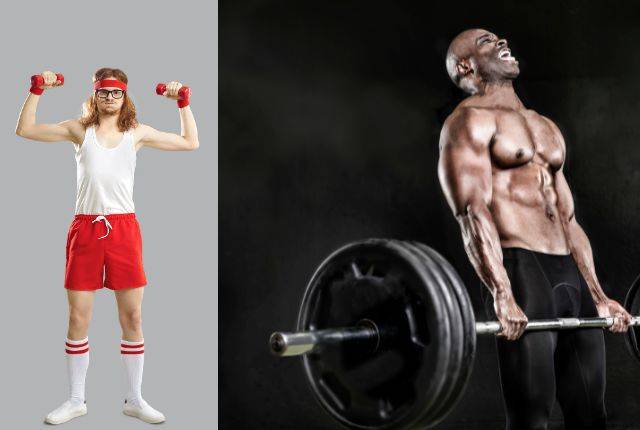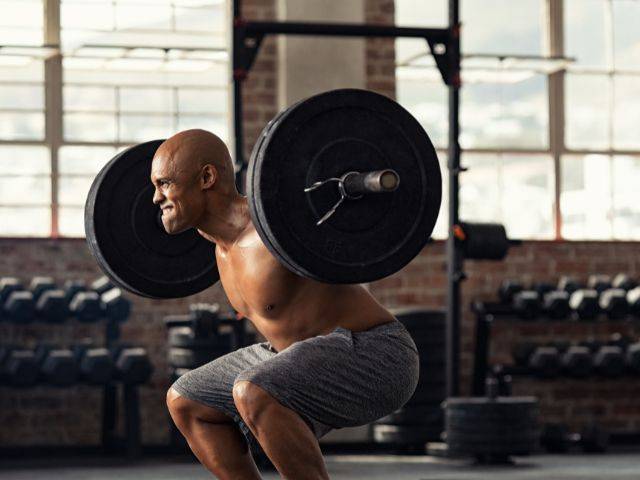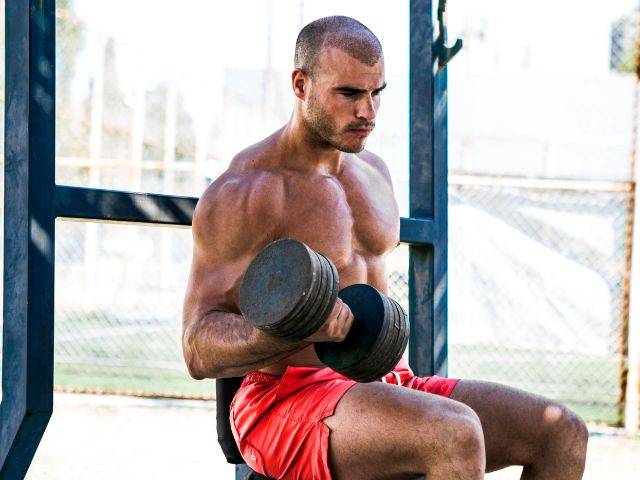
For many skinny guys, trying to build a muscular physique can feel like an uphill battle. However, understanding how to gain muscle as a skinny guy can break down the barriers that stand between you and your desired physique.
With the right knowledge, and a bit of patience, even the skinniest men can transform their bodies.
You might also be interested in this helpful article – How To Gain Muscle: 13 Proven Keys For Optimal Growth
How to Gain Muscle
Here’s your game plan.
- Eat More
To build muscle you need to eat more and be in a calorie surplus. Another way to look at it is as calories in, versus calories or, or be in a positive energy balance.
You need to consume more calories than you burn to gain weight.
Being skinny you might have a faster metabolism. While this can be a blessing for staying lean, it makes muscle gain a tad more challenging. But remember, challenging doesn’t mean impossible.
Aim for nutrient-rich foods that provide quality calories. Incorporate proteins, plenty of healthy fats, whole grains, and plenty of fruits and vegetables.
If you are not seeing any weight gain, up your calories again. If you are still not seeing any muscle gains, track your calories and you might be surprised how little you were eating.

- Have More Protein
While calories are king for putting on weight, protein is the queen and very important.
Protein is the building block of muscles.
The American College of Sports Medicine recommends for building muscle, around 0.5 to 0.8 grams of protein per pound of body weight per day. (1.2-1.7 grams of protein per kilogram of body weight per day.)
If you are training hard, aim for the high end of protein as a guideline.
You can supplement with protein powder shakes if it suits you. But protein powder, but it is a good way of consuming extra calories and protein, while being convenient and cost effective. (Depending on brands.)
- Weight Training is Your Best Friend

To convert those extra calories into muscle, you need resistance training.
Focus on big compound exercises like squats, bench presses, pull ups, shoulder presses and deadlifts. These movements engage multiple muscles, offering more bang for your buck.
Weight machines are good, but as a beginner, mix it up with using plenty of free weights as well, to build knowledge, foundational strength and muscle.
See also – How to Get Big Biceps: Your Ultimate Guide
Common Mistakes When Building Muscle
- Progressive Overload
Make sure you try and either increase the weight or repetitions over time with your workouts.
Progressive overload is the key to getting bigger muscles and stronger.
If you are lifting the same weight, or for the same number of reps in three months’ time, you probably haven’t gotten stronger or bigger. So, try and ad weight to the bar, or add reps to improve.
- Consistency is Crucial

A sporadic approach won’t yield results. Set a workout schedule that you can stick to.
Whether it’s three, four, or five days a week, consistency will be the key to your transformation in the gym.
- Rest and Recovery
Weight training can be hard work on the body, so get some rest.
Muscle growth happens during rest, not during the workout itself.
Give each muscle group ample time to recover before working it again. This not only aids in muscle development but prevents overtraining and injuries. This also helps mentally as well to be enthusiastic about going to the gym.
- Avoid Excessive Cardio
While cardiovascular exercise is great for overall health, too much can counteract your muscle-building efforts by burning the extra calories you’re trying to consume.
If you love cardio, try doing some light cardio that is not too long or hard.
- Stay Hydrated
Water plays an essential role in muscle development and recovery. Aim for at least 6 glasses daily, or more if you’re sweating heavily or it is hot.
A rule of thumb is to monitor your urine. If it is dark yellow, drink more. (Tablets like multi vitamins can affect the color.)
- Track Your Progress
Keep a journal of your workouts.
This not only helps in tracking improvements but can be incredibly motivating when you see the progress you’re making.
As well as tracking your lifts and reps, track your bodyweight as well. Use the mirror, tape measure in conjunction with the scales.
FAQs
Here are some common FAQs in relation to gaining muscle for skinny guys:
Why do I struggle to gain weight even though I eat a lot?

Some skinny guys have faster metabolisms, meaning they burn calories quickly.
Even if you think you’re eating a lot, you might not be consuming enough surplus calories for weight gain and building mass.
Track your calories consumed for a guide. If you don’t see any improvement in muscle, up your calories more and protein intake.
You might be interested in this article – 21 High Protein Dinners with Eggs
Are weight-gainer shakes useful for skinny guys?
Yes, weight-gainer shakes can provide a convenient calorie and protein boost. Weight gainer shakes are the same as protein powder, but they add some more fats and carbs to the formula.
Whole foods should be a primary source of nutrients, but protein powders and weight gain shakes can be convenient and cost effective.
How often should I work out for optimal muscle gain?
For beginners, 3-4 days of weight training per week is recommended. As you progress, you can adjust your routine based on recovery and goals.
Train muscle groups around twice a week. As an example you might train biceps on Tuesday and Saturday.
I’ve gained weight but also noticed an increase in belly fat. Why?
While you need a caloric surplus to gain muscle, excessive calorie intake can lead to fat accumulation. It’s essential to balance calorie intake with muscle-building activity.
You have a few options for losing the belly fat: Cut back slightly on the calories and or increase the trips to the gym, or add an extra session of cardio.
It can be a fine line between gaining muscle and a little bit of fat.
You might be interested in these helpful articles – CICO
Is it necessary to lift heavy weights from the beginning?

No. Start with weights that are challenging but manageable.
Keep your repetitions around the 7 to 15 mark.
Focus on proper form to avoid injuries, gradually increasing the weight as you become stronger.
Why am I sore after workouts, and is it a good sign?
Post-exercise soreness, known as DOMS (Delayed Onset Muscle Soreness), is common and a sign that you’ve effectively stressed the muscles.
However, extreme soreness can indicate overtraining. Cut back on some sets or training sessions if you are too sore all the time. Make sure you are eating plenty of protein as well.
How important is protein in my diet?
Protein is vital for muscle mass. It provides the amino acids necessary to repair and build muscles, especially after workouts.
Can I still do cardio workouts?
Yes, you can. Just ensure that cardio doesn’t overshadow your strength training and that you’re eating enough to compensate for the calories burned.
I’ve been working out for a month but see no results. Why?
Muscle building takes time, patience, and consistency. Ensure your diet, rest, and workout routine align with your goals. Make sure you are using progressive overload and are trying to increase the weight of the bar, or the number of reps you are doing.
Do I need supplements to gain muscle?
Most muscle gain supplements are a waste of money. Weight training and being in a positive energy balance will be more effective than any legal muscle building supplements.
(I am not talking about protein supplementation like protein shakes, weight gainer shakes and protein bars, etc.)
The supplements that might help, generally, only make a tiny bit of difference. In most supplementation form, they are under-dosed as well.
Creatine might be worth looking into if it suits your preferences. Creatine has been scientifically to work, but it still isn’t magic.
Conclusion
Remember, everyone’s body is unique. While guidelines can provide direction, always listen to your body and adjust your approach based on personal experiences and results.
Embarking on the journey of understanding how to gain muscle as a skinny guy might seem daunting at first. But remember, every bodybuilder, weight trainer and athlete started somewhere.
With consistency, a well-structured diet, and the right training regimen, even the most slender frame can become more muscular. So, embrace the challenge and enjoy every step of your muscle building journey.



